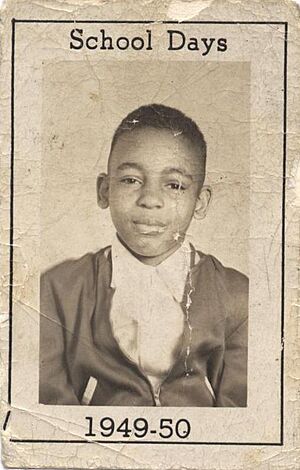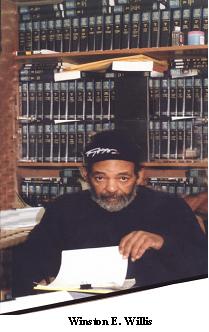Winston E. Willis facts for kids
Winston Earl Willis, born on October 21, 1939, is an American businessman who started his real estate ventures in Cleveland, Ohio, in the early 1960s. He created a company called University Circle Properties Development, Inc. (UCPD, Inc.). This company owned many properties in Cleveland and was a major employer of Black people in that area. At one point, over 23 businesses were operating at East 105th and Euclid under UCPD. In the 1970s and 80s, Willis faced legal challenges and lost his properties in 1983. He has been in ongoing legal battles with the city of Cleveland for many years over the ownership of his lands, even taking his case to the U.S. Supreme Court in 2007.
Contents
Early Life and Moving to Detroit
Winston Willis was born in Montgomery, Alabama. He was the third of five children. His family lived near the City of St. Jude, where the children attended St. Jude Educational Institute. In 1954, when Winston was 14, his family moved to Detroit. His father, who had experience installing carpets, found a good job, and the family settled in a quiet neighborhood. In Detroit, Winston started his own small newspaper called the Western Detroit Shopping News, which he wrote and delivered himself to advertise local businesses.
First Business Adventures
Winston's first job was selling encyclopedias door-to-door. He also used his knowledge of floor coverings, which he learned from his father, to get a job at a tile store in Detroit. He quickly became a manager there. His dream was to go to Hollywood and become the first successful Black movie producer.
In 1958, before heading to the West Coast, he visited relatives in Cleveland. While there, he played a billiards game called One-Pocket and won a lot of money. He decided to stay in Cleveland a bit longer. At just 19 years old, Willis leased an old car showroom and opened a club called The Jazz Temple. It was a coffeehouse and nightclub that did not serve alcohol, and it became very popular right away.
Willis managed to bring famous jazz musicians like Miles Davis, John Coltrane, and Dizzy Gillespie to perform at his club. Famous comedians such as Redd Foxx and Bill Cosby also performed there. The club was a trendy spot for college students and attracted people from different backgrounds. However, this caused some tension in the community. After a bomb was found at the club, Willis decided to close it. He then opened another business, the Hot Potato Restaurant, which helped him fund his next big idea.
Building a Business Empire
Willis had a big dream to bring life back to a large area of land at East 105th Street and Euclid Avenue in Cleveland. This area, known as Doan's Corner, had become run-down after some difficult events in the 1960s. Many businesses on Euclid Avenue were struggling.
After a long legal process, Willis bought the property. It was located between University Circle and the Cleveland Clinic. He then opened many different businesses along this strip of Euclid Avenue. He created University Circle Properties Development, Inc. (UCPD, Inc.) to manage all these stores and shops. His businesses included restaurants, movie theaters, clothing stores, and a food market. At one point, he had 28 businesses running, employing over 400 people. A newspaper article in 1973 even called his work a "Miracle on East 105th Street."
Challenges with the City
The land Willis owned was in an area the city wanted for a large medical and educational complex. This complex would connect Case Western Reserve University, University Hospitals, and the Cleveland Clinic Foundation. Willis fought the city's plans with many lawsuits. Local newspapers reported on his legal battles, with headlines like "Willis Alleges Land Squeeze In Area Around E. 105 and Euclid."
In 1977, a newspaper reported that Willis filed a $100 million lawsuit. He claimed that the Cleveland Clinic Foundation and others were trying to control real estate and break antitrust laws. He said that he and his tenants were being forced out of business. However, many of the lawsuits Willis filed to protect his properties were dismissed by the courts.
The Community Billboards
During his fight with the city, Willis put up a large billboard on the side of one of his buildings. This billboard overlooked Euclid Avenue, a main road for people traveling to downtown Cleveland. He used the billboard to share his opinions about what he saw as unfair practices by local officials and institutions. He also spoke out against what he believed was racism in the community.
This "community billboard" became a well-known sight for people living in the area and visiting Willis's businesses. Willis would change the message on the billboard every two weeks. Many important people in the city found the billboard embarrassing. A respected leader in the Black community, W.O. Walker, even warned Willis to take the billboards down, saying, "These white people will crucify you." Walker also tried to convince the city's planners not to exclude Black businessmen from their development plans, but he was not successful.
Losing His Properties
While Winston Willis was held away from his properties, his business complex and buildings on Euclid Avenue were surrounded by police. For ten days, while he was unable to be there, his properties were quickly torn down. All his lands, buildings, and businesses were taken without him receiving fair payment.
After he was able to return, Willis filed a legal complaint. A law expert, Professor Spencer Neth, studied his case and concluded that a financial accusation against Willis, which had led to him being held away, was not valid. The expert stated that the issue had been resolved. However, the judge in the case did not allow Professor Neth to share his findings in court.
Within a few days, all traces of Willis's business empire were gone, replaced by an empty dirt lot. Willis believes that the historical pattern of taking land from Black people in this country is a continuation of unfair practices.
Recent Years and Continued Fight
After many years of fighting in Cleveland courtrooms to protect his property rights, Willis has become very knowledgeable about legal matters. He now lives a quiet life, far from the busy business world he once knew. Since his large business empire was destroyed in 1982, he has focused on one main goal: getting paid for his lands and receiving the relocation benefits he believes he is owed.
In his ongoing quest, he prepared a special request called a Petition for Writ of Mandamus to the United States Supreme Court. His petition was accepted and recorded, but a short time later, the Court denied it. Despite this setback, Willis continues to fight for his property rights, which he believes are guaranteed by the Constitution. As noted in reports about many other similar cases, these property losses are considered a significant issue in the country's history.
Willis continues to state that denying a person their right to own property is a form of unfairness, saying, "To deny a person their right to own property is a form of slavery. I am a slave without bondage."
Images for kids
 | Jewel Prestage |
 | Ella Baker |
 | Fannie Lou Hamer |



